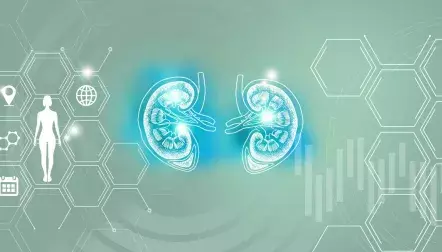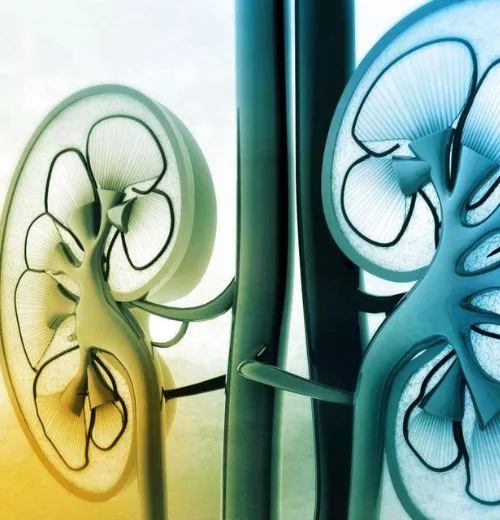
Hepatitis C and kidney disease
While hepatitis C primarily affects the liver, it can also affect the kidneys, leading to kidney disease or making existing kidney conditions worse.

What is Hepatitis C?
Hepatitis C is a viral infection caused by the hepatitis C virus that can lead to liver inflammation (swelling) and disease. It spreads through contact with blood that has the hepatitis C virus, either through sharing needles or syringes, unscreened blood products, or unsafe medical procedures. While hepatitis C primarily affects the liver, it can also affect the kidneys, leading to kidney disease or complicating existing kidney conditions.
Hepatitis C can lead to glomerulonephritis, a type of kidney disease. This disease causes swelling in the kidney's filters, called glomeruli, leading to permanent damage. Damaged filters can cause chronic kidney disease (CKD), which can progress to kidney failure, also called end-stage renal disease (ESRD) or end-stage kidney disease.
How does hepatitis C affect your kidneys?
Hepatitis C doesn't just affect the liver. It can also harm your kidneys in serious ways. If left untreated, the virus can cause kidney damage, lead to chronic kidney disease (CKD), and make existing kidney problems worse.
Hepatitis C can trigger inflammation in the kidneys. Over time, this can lead to types of kidney disease such as membranoproliferative glomerulonephritis (MPGN), where filters in the kidney are damaged by immune system activity. You may not have any symptoms early on, but this damage can get worse if the virus is not treated. Hepatitis C is also more common in people already living with CKD or who are on dialysis.

Hepatitis C and hemodialysis
Hemodialysis is a treatment for kidney failure that uses a machine to clean your blood. During dialysis, needles are used to draw and return blood. If infection control practices are not followed, there is a small risk of hepatitis C spreading. The risk is low because dialysis centers follow strict infection control procedures. However, if these rules are not followed, hepatitis C can spread.
Hepatitis C and peritoneal dialysis
Peritoneal dialysis is another type of dialysis that is usually done at home. Since blood does not leave your body during PD, the risk of getting hepatitis C is much lower compared to hemodialysis.
Hepatitis C and acute kidney injury (AKI)
AKI is when the kidneys have a sudden decline in function, leading to fluid buildup and waste products in the body. This can cause damage to your kidneys leading to CKD, but you can regain kidney function if it is treated quickly. Hepatitis C can sometimes lead to AKI due to:
- Vasculitis (inflammation of blood vessels), which can affect kidney function
- Certain hepatitis C medicines may increase the risk of AKI, which is rare
How do you get hepatitis C?
Hepatitis C spreads when someone encounters an infected person's blood. You can get hepatitis C from:
- Sharing needles or syringes for drug use
- Unscreened blood products
- Receiving treatment in unhygienic healthcare facilities
Less common ways of getting hepatitis C include:
- Being born to a mother who has hepatitis C
- Having sexual contact with someone who has hepatitis C
- Sharing personal items like razors with someone who has hepatitis C (because of potential blood exposure)
- Tattoos and piercings (if proper safety practices aren't followed)
Who is at risk for hepatitis C?
Some people have a higher risk of getting hepatitis C, including:
- People born between 1945 and 1965 (baby boomers). The CDC recommends that this group be tested for hepatitis C.
- People who received donated blood or had medical procedures before 1992, when blood screening was not as advanced.
- People who inject or have injected illegal drugs (like heroin)
- People on hemodialysis
- Healthcare workers who handle blood
- People with HIV/AIDS
- Children born to mothers with hepatitis C
What are the symptoms of hepatitis C?
Most people with hepatitis C don't have symptoms at first. If symptoms happen, they can include:
- Fever
- Fatigue (feeling very tired)
- Nausea or vomiting
- Loss of appetite
- Dark-colored urine (pee)
- Grey-colored stool
- Joint pain
- Jaundice (yellowing skin or eyes)
How do I find out if I have hepatitis C?
To find out if you have hepatitis C, you'll need a blood test. The testing process involves two steps:
- Hepatitis C Antibody Test:
This test checks for antibodies your body makes after being exposed to the hepatitis C virus. A positive result means you were exposed to the hepatitis C Virus at some point — but it doesn't necessarily mean you still have the virus. - Hepatitis C RNA (Viral Load) Test:
If your antibody test is positive, this follow-up test looks for the actual virus in your blood. A positive RNA test means the infection is active, and you need treatment. If the RNA test is negative, your body may have cleared the virus on its own.
Even if you don't have an active hepatitis C infection, past exposure may still put stress on your liver and kidneys, especially if you have other health conditions like diabetes or high blood pressure.
If you've ever tested positive for hepatitis C antibodies, ask your doctor if you should be screened regularly for kidney problems, even if your RNA test came back negative.
The importance of getting testing
Getting tested is important for protecting your kidney health, especially if you have or have had hepatitis C. The virus can damage your kidneys over time, even if you don't have symptoms. Regular checkups can help catch problems early and keep your kidneys working well. Read more about kidney tests, what to expect, and why they matter.
Can you get a kidney transplant with hepatitis C?
Having hepatitis C does not automatically disqualify you from getting a kidney transplant.
If your liver is severely damaged, it may affect your transplant eligibility. If you receive a kidney from a donor who has hepatitis C, you will be treated to cure hepatitis C after the transplant.
Organs from donors with hepatitis C (HCV-positive) can be used for transplants and may be offered to both HCV-positive and HCV-negative recipients. These organs can shorten wait times and improve access to transplant. If you receive a kidney from a donor with hepatitis C, the virus can be cured with antiviral medication. Your transplant team will monitor you closely to manage and treat any infection. Ask your transplant team if you're eligible to receive an HCV-positive organ.
What are the treatment options for Hepatitis C?
Treatment options depend on your overall health and the kidney conditions you have. There are medicines that can cure hepatitis C. Always talk to your doctor about the best treatment option for you.
Talk to Your Doctor
If you think you are at risk of hepatitis C or have symptoms, talk to your doctor. Getting tested and starting treatment early can protect your health and prevent serious kidney damage.
Learn more about other diseases that affect your kidneys.

